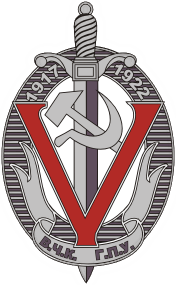Cheka
Cheka (Lua error in package.lua at line 80: module 'strict' not found.
, short for "Чрезвычайная комиссия" or "Extraordinary Commission") was the first of a succession of Soviet state security organizations. Established on December 20, 1917, by the Bolshevik government, it was initially tasked with combating counter-revolution and sabotage. The Cheka played a crucial role during the Russian Civil War and the early years of the Soviet Union.
History[edit | edit source]
The Cheka was founded by Vladimir Lenin and led by Felix Dzerzhinsky. It was created to consolidate the Bolshevik hold on power by eliminating political opposition and suppressing counter-revolutionary activities. The organization quickly gained a reputation for its ruthless methods, including mass executions and the use of torture.
Formation and Early Activities[edit | edit source]
The Cheka was established by a decree issued by the Council of People's Commissars (Sovnarkom) and was initially a small organization. However, it rapidly expanded its operations and personnel. The Cheka was instrumental in the Red Terror, a campaign of political repression and mass killings carried out by the Bolsheviks during the Russian Civil War.
Role in the Russian Civil War[edit | edit source]
During the Russian Civil War, the Cheka was responsible for the suppression of anti-Bolshevik uprisings and the elimination of perceived enemies of the state. It operated with considerable autonomy and had the authority to arrest, detain, and execute individuals without trial. The Cheka's activities were marked by widespread brutality and the use of summary executions.
Transformation and Legacy[edit | edit source]
In 1922, the Cheka was reorganized into the State Political Directorate (GPU), which later became the Joint State Political Directorate (OGPU) and eventually the NKVD. Despite these changes, the legacy of the Cheka's methods and its role in establishing a system of state security and political repression continued throughout Soviet history.
Structure and Operations[edit | edit source]
The Cheka was structured as a centralized organization with regional branches known as "Cheka units." It operated under the direct control of the Bolshevik leadership and had extensive powers to combat counter-revolutionary activities. The organization employed a network of informants and agents to gather intelligence and carry out its operations.
Notable Figures[edit | edit source]
- Felix Dzerzhinsky - The first head of the Cheka, known for his dedication to the Bolshevik cause and his ruthless methods.
- Vladimir Lenin - The leader of the Bolshevik Party and the driving force behind the establishment of the Cheka.
Impact and Controversy[edit | edit source]
The Cheka's methods and actions have been the subject of significant controversy and debate. While some view it as a necessary tool for the survival of the Bolshevik regime, others criticize it for its brutality and the widespread human rights abuses it perpetrated. The Cheka's legacy is a complex and contentious aspect of Soviet history.
Related Pages[edit | edit source]
Categories[edit | edit source]
This article is a Soviet Union–related stub. You can help WikiMD by expanding it!
Search WikiMD
Ad.Tired of being Overweight? Try W8MD's physician weight loss program.
Semaglutide (Ozempic / Wegovy and Tirzepatide (Mounjaro / Zepbound) available.
Advertise on WikiMD
|
WikiMD's Wellness Encyclopedia |
| Let Food Be Thy Medicine Medicine Thy Food - Hippocrates |
Translate this page: - East Asian
中文,
日本,
한국어,
South Asian
हिन्दी,
தமிழ்,
తెలుగు,
Urdu,
ಕನ್ನಡ,
Southeast Asian
Indonesian,
Vietnamese,
Thai,
မြန်မာဘာသာ,
বাংলা
European
español,
Deutsch,
français,
Greek,
português do Brasil,
polski,
română,
русский,
Nederlands,
norsk,
svenska,
suomi,
Italian
Middle Eastern & African
عربى,
Turkish,
Persian,
Hebrew,
Afrikaans,
isiZulu,
Kiswahili,
Other
Bulgarian,
Hungarian,
Czech,
Swedish,
മലയാളം,
मराठी,
ਪੰਜਾਬੀ,
ગુજરાતી,
Portuguese,
Ukrainian
Medical Disclaimer: WikiMD is not a substitute for professional medical advice. The information on WikiMD is provided as an information resource only, may be incorrect, outdated or misleading, and is not to be used or relied on for any diagnostic or treatment purposes. Please consult your health care provider before making any healthcare decisions or for guidance about a specific medical condition. WikiMD expressly disclaims responsibility, and shall have no liability, for any damages, loss, injury, or liability whatsoever suffered as a result of your reliance on the information contained in this site. By visiting this site you agree to the foregoing terms and conditions, which may from time to time be changed or supplemented by WikiMD. If you do not agree to the foregoing terms and conditions, you should not enter or use this site. See full disclaimer.
Credits:Most images are courtesy of Wikimedia commons, and templates, categories Wikipedia, licensed under CC BY SA or similar.
Contributors: Prab R. Tumpati, MD







